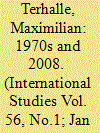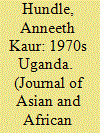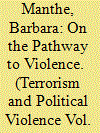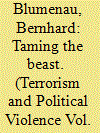|
|
|
Sort Order |
|
|
|
Items / Page
|
|
|
|
|
|
|
| Srl | Item |
| 1 |
ID:
166024


|
|
|
|
|
| Summary/Abstract |
Many Western and non-Western scholars consider the 2008 financial crisis a fundamental caesura, precipitating a decentred globalism. However, they have neither conceptualized the foundations of the dynamics that developed before this caesura nor have they theorized the amalgamating process which ultimately merged the hitherto overlooked and the formerly predominant Western forces and actors. Addressing this deficit, this article presents two innovations. First, it re-conceptualizes the 1970s by integrating two macro-developments: China’s deviation from patterns of the former Third World’s development and the thickening of liberal politico-economic institutions. Their relationship was complementary, but independent, since heterogeneous purposes drove these strands. Neither was disrupted by the end of bipolarity. Thereby, this article offers the first narrative of the years 1970–2008, viewing them as the incubation period of both strands’ simultaneous development before their fusion in ‘decentred globalism’. Consequently, the 1970s supersede International Relations (IR’s) hegemonic benchmark date of 1989–1991. Second, the article accounts for the merging of macro-developments. It argues that, despite regularities, international social life is characterized by heterogeneous purposes derived from different social contexts, reflecting an environment that operates in multidirectional ways. Large trends in the environment, such as those of the 1970s, may coincide at contingent points in time (e.g., 2008). Based on comprehensive reviews of distinct literatures, these two innovations emerge as the key building blocks for the development of a theory of benchmark dates for a ‘decentred’ global order.
|
|
|
|
|
|
|
|
|
|
|
|
|
|
|
|
| 2 |
ID:
159772


|
|
|
|
|
| Summary/Abstract |
This paper explores the ongoing presence of the 1972 expulsion of the racialized Asian population by former president Idi Amin in contemporary Uganda. The expulsion was a “critical event” and thus the paper uses an “anthropology of the event” approach to focus on the architecture of silence and historical consciousness of the event in urban Kampala. The four arenas of focus are: (1) official state narratives; (2) community mobilization and public forums on urban African-Asian relations; (3) memories, adventure tales, and narratives expressed by Ugandan Asian men; and (4) the infrastructure and material culture of 1970s Asian property expropriation.
|
|
|
|
|
|
|
|
|
|
|
|
|
|
|
|
| 3 |
ID:
178903


|
|
|
|
|
| Summary/Abstract |
West German society faced the emergence of a new calibre of right-wing terrorism in the 1970s. Right-wing terrorist groups evolved that showed themselves willing and able to commit violent attacks such as bombings and murder. This article explores the genesis and development of right-wing terrorism in West Germany between 1970 and 1980 while examining 22 identifiable groups and lone actors and taking into consideration the radicalization within the far right as well as the prevailing social conditions. West German right-wing terrorism until 1990 has remained a blind spot in historiography to this day. This article contributes to historical terrorism studies as well as to studies into the far right while applying historical-qualitative methods and interpreting primary sources. Using an approach informed by social history, this paper sheds new light on the individual participants, groups, and networks of right-wing terrorism as well as on its topics and targets. While taking into account a more dynamic definition of right-wing terrorism, this paper disengages from definitions that identify terrorism solely as a threat to the state itself. This makes possible a multidimensional approach employing contemporary history and studies in both terrorism and right-wing extremism.
|
|
|
|
|
|
|
|
|
|
|
|
|
|
|
|
| 4 |
ID:
138786


|
|
|
|
|
| Summary/Abstract |
In the 1970s, Western European countries were hit hard by terrorism, especially by international terrorism that crossed borders easily and allowed terrorists of different origins to carry out attacks against both governments and people. Consequently, the necessity of fighting this menace also extended to international organisations. This article looks at how the Council of Europe dealt with the issue, and assesses the negotiations that led to the Convention on the Suppression of Terrorism from the German perspective. West Germany was very interested in establishing a sounder international legal framework against terrorism and thought that the Council of Europe would be able to make an important contribution by abolishing the political offence exception that had so far been a core feature of most extradition treaties. This clause allowed political criminals to escape punishment by fleeing to a country that would deny extradition to a different country on the grounds of the political nature of the act committed by the person in question. The article gives an account and analysis of the complex negotiations that finally resulted in the adoption of the Convention in 1977, as well as of the problems encountered and compromises reached during these negotiations.
|
|
|
|
|
|
|
|
|
|
|
|
|
|
|
|
|
|
|
|
|